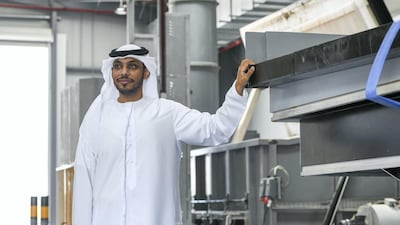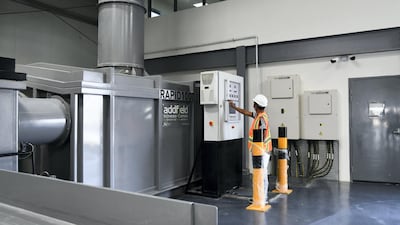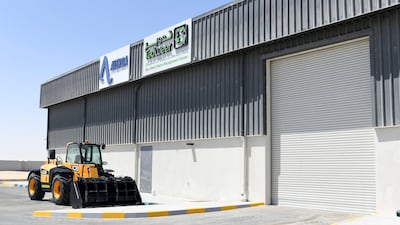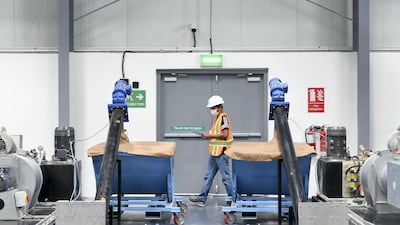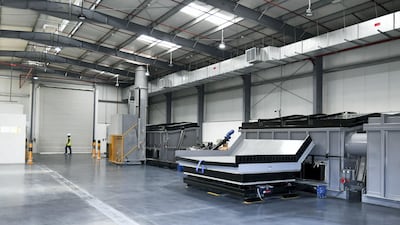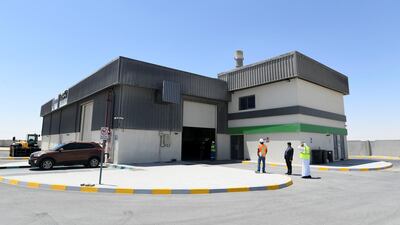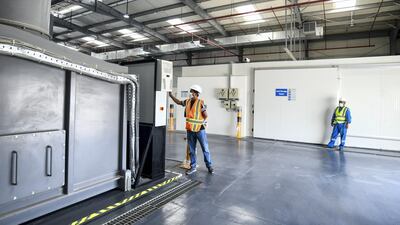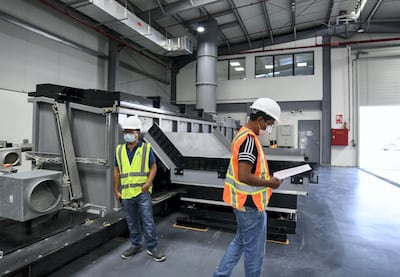An incinerator constructed in Abu Dhabi will provide hygienic disposal for thousands of tonnes of fallen livestock each year.
The plant, which is scheduled to open within the next few months, will cremate dead animals using an environmentally friendly method instead of sending carcasses to landfill.
Cremation is designed to prevent the spread of bacteria and viruses that can occur when diseased animals are buried, said Abdulaziz Al Jaberi, senior project manager at Abu Dhabi Waste Management Centre (Tadweer).
“If one animal catches a disease, it could spread to other animals and humans even after it is buried,” Mr Al Jaberi said.
“It is not safe to dispose or bury the animal, as viruses and bacteria can be transferred through the soil and underground water, and then the whole community will be affected.
“This is a big issue. That is why fallen stock shouldn’t be buried."
Diseases such as bovine spongiform encephalopathy (mad cow disease), bird flu and swine flu can spread quickly through farm stock, and also pass from animals to humans.
Scientists studying the source of the coronavirus think this is one theory about how the pandemic started.
A World Health Organisation report recently said it was "likely" that the coronavirus originated in animals, and made the jump to humans through an as-yet unidentified intermediary animal.
This potential threat of animal diseases to humans is why incineration is the best way to dispose of carcasses safely, Mr Al Jaberi said.
"It is very important to have a good system in place,” he said.
"If there is a dead animal, take it automatically to the system and burn it."
How does the new incinerator work?
The National visited the Abu Dhabi city facility, which is located between the capital and Al Dhafra.
The 3,710 square metre plant is ready to operate but is awaiting Tadweer certification.
The treatment process takes 45 minutes for big animals, and 15 minutes for smaller ones.
“In [Tadweer's plant at] Al Ain, smaller animals make up 80 per cent of the stock they receive,” Mr Al Jaberi said.
One chamber burns at 850°C and has been designed for the bodies of small-sized animals like sheep, hens and goats.
Next to it is a larger incinerator that cremates the bodies of larger animals like camels, cows and horses at 1,000°C.
The plant also treats noxious gases that emerge during the process.
“After the burning, the gases go to the secondary chamber where they are burnt at 1,000°C to ensure all the gases are treated, and only non-toxic gas is released back into the air through the chimney," Mr Al Jaberi said.
“This is very important, otherwise harmful gases will go out to the atmosphere.”
The biggest challenge of the project, however, was controlling the stench that comes from the decomposing carcasses, so the engineers created an odour control system.
Fans have been placed alongside the walls close to the ceiling. On one side, the fans expel air and on the other side they suck it in. This ensures a flow of air through the room to clear the smell.
The site also includes a machine that cleans the vehicles that carry the carcasses, to ensure they are decontaminated before they return to the city.
Further protective measures include the design of the incinerator itself.
The chamber walls are very thick to ensure the heat does not escape, and the bodies of the dead animals are lifted to the big chamber using a lifting plate.
This ensures "there is no human interaction with them at all," Mr Al Jaberi said.
The economic benefit of recycling

Tadweer set up its first incinerator at Al Ain in 2010, and the plant has acted as a successful model, Mr Al Jaberi said.
“Since we proved to have a good approach there, minimised the ashes and saved land, Tadweer decided to apply the same approach in Abu Dhabi city," he said.
“The next stage will include a new plant to serve Al Dhafra.”
The plant in Al Ain has processed around 100,000 tonnes of fallen stock every year since it started operations, an average of 20 tonnes per day.
The plant is now being expanded to include the pilot for a recycling system that could become a source of revenue.
It will be the first time for such a system in the GCC, Mr Al Jaberi said.
“In Europe, they extract protein out of them [dead animals] and there is a very good market for it,” he said.
“The country is now focusing on recycling and decreasing disposal, so when the project is up and running, and we see the demand for the recycled product in the market, we can limit incineration and focus on recycling.”
